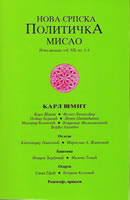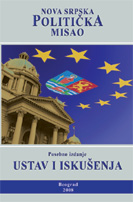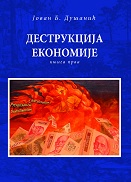| NSPM in English | |||
Serbia should not join Nato |
 |
 |
 |
| петак, 05. фебруар 2010. | |
|
(Guardian, 3.3.2010)
I do not consider this to be a real danger, especially since President Barack Obama stated: "America will never impose a security arrangement on another country. For any country to become a member of an organization like Nato, for example, a majority of its people must choose to… And let me be clear: Nato should be seeking collaboration with Russia, not confrontation." The following recent statement by Anders Fogh Rasmussen, secretary general of Nato, is also important: "It is up to the citizens of Serbia to decide whether Alliance membership would benefit their country". The only relevant political, legal, and moral expression of the wishes of the people of Serbia in favour of "military neutrality" so far has been the adoption of a declaration in the National Assembly on 26 December 2007 (this declaration is regularly supported by public opinion surveys). There is no doubt that the most democratic way would be for this view to be tested directly by way of a referendum. Here is what the Serbian president Boris Tadic, quoted by the Tanjug news agency, said in December 2009: "Speaking about Nato, Tadic said that a referendum on membership is not imperative, but that it is his political position that a referendum has to be held. It is a big question whether Serbia will ever organize a referendum on Nato membership, Tadic said, pointing out that the assembly has adopted a resolution on Serbia's military neutrality. Integration in Nato, Tadic stressed, is not on the agenda and it is not a condition for membership in the European Union." I am in favour of a public debate before a referendum, a debate which is necessary because differences in statements made by Serbian officials are causing confusion. If it joined Nato, Serbia would only hamper a re-examination and improvement of Nato's role and its relations with Russia. Serbia should, therefore, urge a constructive approach to Russia's initiative for a new international security treaty. Often, Nato does not know what to do with itself, as evident from the fact that it sought to expand its role by mounting a "humanitarian" attack on Serbia and Montenegro. As a country that puts such high value on its independence and dignity, Serbia should contribute to the creation of post-cold war security arrangements by restricting itself to bilateral military co-operation with the United States, Russia, the EU countries, China, India, and so on. It is enough that Serbia is a member of the Partnership for Peace programme with Nato. If it became a Nato member, it could not retain its close ties with the important group of nonaligned countries, nor could it preserve its reputation as a country that participates in UN peace missions on a principled basis. It would certainly contribute to mutual confidence-building if the United States and Russia publicly agreed that they would respect Serbia's decision to stay out of military alliances. Why should the United States not agree to this if, as its officials are saying, it wants to "reset" relations with Serbia? This would provide a good case study for other cases where the United States and Russia are vying for military influence. Pluralisation — instead of singularisation — of foreign and security policy is what gives "intelligent power" to a small state such as Serbia. This plurality of orientations (which has replaced the singularity that was characteristic of the early years of DOS rule after the regime change of 5 October 2000) is also a reaction to the huge change that has occurred in the international balance of power. The United States is in transition from feeling and behaving like a "superpower" to realising that it is just one of the big powers (albeit more powerful than the others in some respects) and acting accordingly. Russia, for its part, is in transition from behaving like a small power to developing self-awareness and behaving like a great power. |
Од истог аутора
Остали чланци у рубрици
- Playing With Fire in Ukraine
- Kosovo as a res extra commercium and the alchemy of colonization
- The Balkans XX years after NATO aggression: the case of the Republic of Srpska – past, present and future
- Из архиве - Remarks Before the Foreign Affairs Committee of the European Parliament
- Dysfunction in the Balkans - Can the Post-Yugoslav Settlement Survive?
- Serbia’s latest would-be savior is a modernizer, a strongman - or both
- Why the Ukraine Crisis Is the West’s Fault
- The Ghosts of World War I Circle over Ukraine
- Nato's action plan in Ukraine is right out of Dr Strangelove
- Why Yanukovych Said No to Europe

.jpg)








 A few years ago, I would have accepted the argument that
A few years ago, I would have accepted the argument that 












